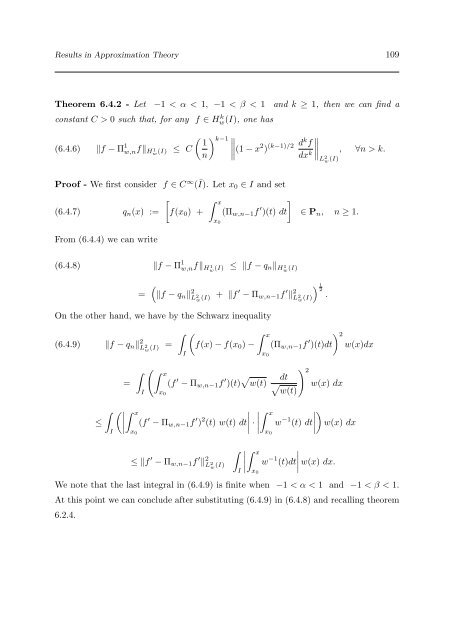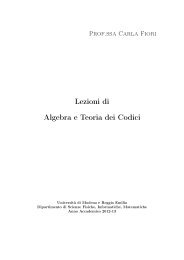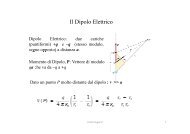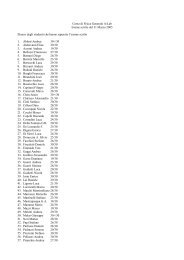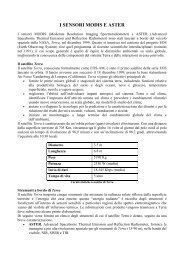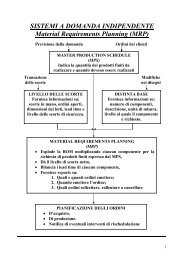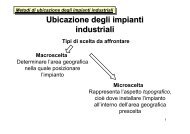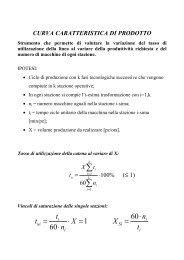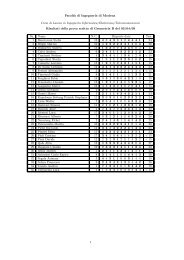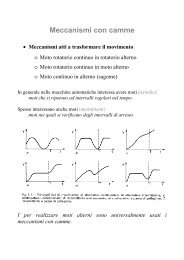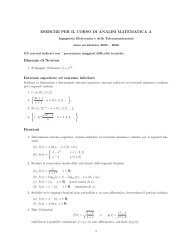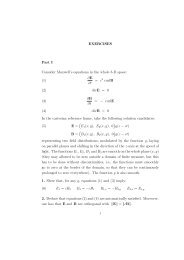- Page 7 and 8:
PREFACE This book is devoted to the
- Page 9 and 10:
CONTENTS 1. Special families of pol
- Page 11 and 12:
Contents ix 7. Derivative Matrices
- Page 13 and 14:
1 SPECIAL FAMILIES OF POLYNOMIALS A
- Page 15 and 16:
Special Families of Polynomials 3 n
- Page 17 and 18:
Special Families of Polynomials 5 B
- Page 19 and 20:
Special Families of Polynomials 7 1
- Page 21 and 22:
Special Families of Polynomials 9 (
- Page 23 and 24:
Special Families of Polynomials 11
- Page 25 and 26:
Special Families of Polynomials 13
- Page 27 and 28:
Special Families of Polynomials 15
- Page 29 and 30:
Special Families of Polynomials 17
- Page 31 and 32:
Special Families of Polynomials 19
- Page 33 and 34:
2 ORTHOGONALITY Inner products and
- Page 35 and 36:
Orthogonality 23 The function w is
- Page 37 and 38:
Orthogonality 25 As we promised, we
- Page 39 and 40:
Orthogonality 27 Let us now define
- Page 41 and 42:
Orthogonality 29 Therefore, one obt
- Page 43 and 44:
Orthogonality 31 From (2.3.8), we g
- Page 45 and 46:
Orthogonality 33 only mention the r
- Page 47 and 48:
3 NUMERICAL INTEGRATION As we shall
- Page 49 and 50:
Numerical Integration 37 In the cas
- Page 51 and 52:
Numerical Integration 39 (3.1.9) z
- Page 53 and 54:
Numerical Integration 41 We give th
- Page 55 and 56:
Numerical Integration 43 where 1
- Page 57 and 58:
Numerical Integration 45 (3.2.10)
- Page 59 and 60:
Numerical Integration 47 This means
- Page 61 and 62:
Numerical Integration 49 (3.4.2) w
- Page 63 and 64:
Numerical Integration 51 3.5 Gauss-
- Page 65 and 66:
Numerical Integration 53 The proof
- Page 67 and 68:
Numerical Integration 55 3.7 Clensh
- Page 69 and 70: Numerical Integration 57 the first
- Page 71 and 72: Numerical Integration 59 (3.8.14) p
- Page 73 and 74: Numerical Integration 61 (3.9.5) p
- Page 75: Numerical Integration 63 (3.10.5)
- Page 78 and 79: 66 Polynomial Approximation of Diff
- Page 80 and 81: 68 Polynomial Approximation of Diff
- Page 82 and 83: 70 Polynomial Approximation of Diff
- Page 84 and 85: 72 Polynomial Approximation of Diff
- Page 86 and 87: 74 Polynomial Approximation of Diff
- Page 88 and 89: 76 Polynomial Approximation of Diff
- Page 90 and 91: 78 Polynomial Approximation of Diff
- Page 92 and 93: 80 Polynomial Approximation of Diff
- Page 94 and 95: 82 Polynomial Approximation of Diff
- Page 96 and 97: 84 Polynomial Approximation of Diff
- Page 98 and 99: 86 Polynomial Approximation of Diff
- Page 100 and 101: 88 Polynomial Approximation of Diff
- Page 102 and 103: 90 Polynomial Approximation of Diff
- Page 104 and 105: 92 Polynomial Approximation of Diff
- Page 106 and 107: 94 Polynomial Approximation of Diff
- Page 108 and 109: 96 Polynomial Approximation of Diff
- Page 110 and 111: 98 Polynomial Approximation of Diff
- Page 112 and 113: 100 Polynomial Approximation of Dif
- Page 114 and 115: 102 Polynomial Approximation of Dif
- Page 116 and 117: 104 Polynomial Approximation of Dif
- Page 118 and 119: 106 Polynomial Approximation of Dif
- Page 122 and 123: 110 Polynomial Approximation of Dif
- Page 124 and 125: 112 Polynomial Approximation of Dif
- Page 126 and 127: 114 Polynomial Approximation of Dif
- Page 128 and 129: 116 Polynomial Approximation of Dif
- Page 130 and 131: 118 Polynomial Approximation of Dif
- Page 132 and 133: 120 Polynomial Approximation of Dif
- Page 134 and 135: 122 Polynomial Approximation of Dif
- Page 136 and 137: 124 Polynomial Approximation of Dif
- Page 138 and 139: 126 Polynomial Approximation of Dif
- Page 140 and 141: 128 Polynomial Approximation of Dif
- Page 142 and 143: 130 Polynomial Approximation of Dif
- Page 144 and 145: 132 Polynomial Approximation of Dif
- Page 146 and 147: 134 Polynomial Approximation of Dif
- Page 148 and 149: 136 Polynomial Approximation of Dif
- Page 150 and 151: 138 Polynomial Approximation of Dif
- Page 152 and 153: 140 Polynomial Approximation of Dif
- Page 154 and 155: 142 Polynomial Approximation of Dif
- Page 156 and 157: 144 Polynomial Approximation of Dif
- Page 158 and 159: 146 Polynomial Approximation of Dif
- Page 160 and 161: 148 Polynomial Approximation of Dif
- Page 162 and 163: 150 Polynomial Approximation of Dif
- Page 164 and 165: 152 Polynomial Approximation of Dif
- Page 166 and 167: 154 Polynomial Approximation of Dif
- Page 168 and 169: 156 Polynomial Approximation of Dif
- Page 170 and 171:
158 Polynomial Approximation of Dif
- Page 172 and 173:
160 Polynomial Approximation of Dif
- Page 174 and 175:
162 Polynomial Approximation of Dif
- Page 176 and 177:
164 Polynomial Approximation of Dif
- Page 178 and 179:
166 Polynomial Approximation of Dif
- Page 180 and 181:
168 Polynomial Approximation of Dif
- Page 182 and 183:
170 Polynomial Approximation of Dif
- Page 184 and 185:
172 Polynomial Approximation of Dif
- Page 186 and 187:
174 Polynomial Approximation of Dif
- Page 188 and 189:
176 Polynomial Approximation of Dif
- Page 190 and 191:
178 Polynomial Approximation of Dif
- Page 192 and 193:
180 Polynomial Approximation of Dif
- Page 194 and 195:
182 Polynomial Approximation of Dif
- Page 196 and 197:
184 Polynomial Approximation of Dif
- Page 198 and 199:
186 Polynomial Approximation of Dif
- Page 200 and 201:
188 Polynomial Approximation of Dif
- Page 202 and 203:
190 Polynomial Approximation of Dif
- Page 204 and 205:
192 Polynomial Approximation of Dif
- Page 206 and 207:
194 Polynomial Approximation of Dif
- Page 208 and 209:
196 Polynomial Approximation of Dif
- Page 210 and 211:
198 Polynomial Approximation of Dif
- Page 212 and 213:
200 Polynomial Approximation of Dif
- Page 214 and 215:
202 Polynomial Approximation of Dif
- Page 216 and 217:
204 Polynomial Approximation of Dif
- Page 218 and 219:
206 Polynomial Approximation of Dif
- Page 220 and 221:
208 Polynomial Approximation of Dif
- Page 222 and 223:
210 Polynomial Approximation of Dif
- Page 224 and 225:
212 Polynomial Approximation of Dif
- Page 226 and 227:
214 Polynomial Approximation of Dif
- Page 228 and 229:
216 Polynomial Approximation of Dif
- Page 230 and 231:
218 Polynomial Approximation of Dif
- Page 232 and 233:
220 Polynomial Approximation of Dif
- Page 234 and 235:
222 Polynomial Approximation of Dif
- Page 236 and 237:
224 Polynomial Approximation of Dif
- Page 238 and 239:
226 Polynomial Approximation of Dif
- Page 240 and 241:
228 Polynomial Approximation of Dif
- Page 242 and 243:
230 Polynomial Approximation of Dif
- Page 244 and 245:
232 Polynomial Approximation of Dif
- Page 246 and 247:
234 Polynomial Approximation of Dif
- Page 248 and 249:
236 Polynomial Approximation of Dif
- Page 250 and 251:
238 Polynomial Approximation of Dif
- Page 252 and 253:
240 Polynomial Approximation of Dif
- Page 254 and 255:
242 Polynomial Approximation of Dif
- Page 256 and 257:
244 Polynomial Approximation of Dif
- Page 258 and 259:
246 Polynomial Approximation of Dif
- Page 260 and 261:
248 Polynomial Approximation of Dif
- Page 262 and 263:
250 Polynomial Approximation of Dif
- Page 264 and 265:
252 Polynomial Approximation of Dif
- Page 266 and 267:
254 Polynomial Approximation of Dif
- Page 268 and 269:
256 Polynomial Approximation of Dif
- Page 270 and 271:
258 Polynomial Approximation of Dif
- Page 272 and 273:
260 Polynomial Approximation of Dif
- Page 274 and 275:
262 Polynomial Approximation of Dif
- Page 276 and 277:
264 Polynomial Approximation of Dif
- Page 278 and 279:
266 Polynomial Approximation of Dif
- Page 280 and 281:
268 Polynomial Approximation of Dif
- Page 282 and 283:
270 Polynomial Approximation of Dif
- Page 284 and 285:
272 Polynomial Approximation of Dif
- Page 286 and 287:
274 Polynomial Approximation of Dif
- Page 288 and 289:
276 Polynomial Approximation of Dif
- Page 290 and 291:
278 Polynomial Approximation of Dif
- Page 292 and 293:
280 Polynomial Approximation of Dif
- Page 294 and 295:
282 Polynomial Approximation of Dif
- Page 296 and 297:
284 Polynomial Approximation of Dif
- Page 298 and 299:
286 Polynomial Approximation of Dif
- Page 300 and 301:
288 Polynomial Approximation of Dif
- Page 302 and 303:
290 Polynomial Approximation of Dif
- Page 305 and 306:
REFERENCES adams r.(1975), Sobolev
- Page 307 and 308:
References 295 canuto c., hussaini
- Page 309 and 310:
References 297 friedman a.(1959), F
- Page 311 and 312:
References 299 jackson d.(1930), Th
- Page 313 and 314:
References 301 pavoni d.(1988), Sin
- Page 315:
References 303 vainikko g.m.(1964),


